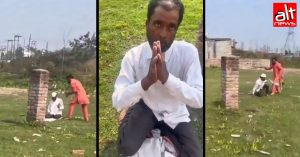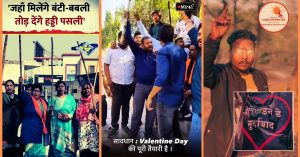Ali Khan Mahmudabad, an associate professor who teaches political science at Ashoka University, was arrested on Sunday, May 18. The arrest comes ten days after his Facebook post on the India-Pakistan conflict ruffled feathers.
Two complaints were filed against him with the Haryana police; one by the Sarpanch of Jatheri, a village in Haryana, and another by Renu Bhatia, chairperson of the Haryana State Commission for Women (HCW).
Besides an academic commentary on India’s military response against Pakistan and what it means for India-Pakistan relations, Khan had remarked on the ‘optics’ of the press briefings by the defence forces by having a Muslim woman officer, Colonel Sofiya Qureshi, as the face of India’s military operation.
“The optics of two women soldiers presenting their findings is importantly but optics must translate to reality on the ground otherwise it’s just hypocrisy… the grassroots reality that common Muslims face is different from what the government tried to show but at the same time the press conference shows that an India, united it its diversity, is not completely dead as an idea,” he wrote on Facebook on May 8, a day after India launched Operation Sindoor.
Complaints
According to a copy of one of the FIRs (first information report) reviewed by Alt News, Khan has been arrested under sections 196(1)(b), 197(1)(c), 152 and 299 of the Bharatiya Nyaya Sanhita (BNS). One of the lawyers working on the case confirmed the charges to Alt News.
This FIR was filed by a Yogesh, the village chief of Jatheri in the Sonepat district of Haryana. In his complaint, he said that at a time when Indians needed to stand united against a foreign power (Pakistan), Khan was trying to incite people against the country and hurting religious sentiments by saying that Colonel Sofiya Qureshi’s presence at the press briefings on Operation Sindoor were a mere show by the government, which otherwise works against the prevention of crimes against Muslims.
Yogesh also claimed that Khan blamed ‘mad’ armymen for escalating tensions and conflicts between India and Pakistan. While he claimed that these comments were made in person by Ali Khan in front of a few others, he also mentioned Khan’s X and Facebook posts from May 8 in the FIR.
This FIR has been registered under the Rai Police Station, Sonepat, Haryana. The complaint was filed at 8:15 pm on May 17; Khan was arrested the following morning.
Alt News was unable to access the FIR filed by Renu Bhatia for specific details. However, Narender Kadian, deputy commissioner of police (crime), Haryana, told the press on May 18 that Bhatia’s FIR was against Khan’s posts on Facebook as well as him skipping the summons issued by the women’s commission. He added that the FIR invokes sections 353, 79, 152 and 169(1) of the BNS against the professor.
The Haryana State Commission for Women had issued a notice to Khan on May 12 after taking suo motu cognisance of his social media posts (a reference to one of these was also made by Yogesh in his FIR).
The HCW complaint against Khan, accessed by Alt News, expresses concern over his remarks. The complaint says his remarks disparage women in uniform, misrepresent facts (by using terms like “genocide” and “dehumanisation” in the posts) and vilify military actions and the role of women officers against cross-border terrorism. It also said that Khan’s posts had the potential to incite communal unrest and violate women’s dignity, outrage their modesty and breach the University Grants Commission’s ethical conduct regulations for faculty. Two posts by the professor, one from May 8 and another from May 11, were attached to the complaint. Khan was asked to appear before the Commission on May 14 along with a written explanation, in the form of an affidavit, of his statements and materials or documents to justify his remarks. He was also directed to carry a copy of Ashoka University’s code of conduct for faculty and a copy of his employment contract.
But what is it that Khan exactly said in his Facebook and X posts that called for such a strong reaction from the women’s commission and the village chief?
What Did Khan Say?
On May 8, a day after the Indian defence forces launched the military strikes targeting terror sites in Pakistan, the Ashoka University professor wrote a post on Facebook summarising the India-Pakistan conflict.
It begins with, “Strategically India has actually begun a new phase in terms of collapsing distinction between military and terrorist (non-state actors) in Pakistan” and goes on to say that Operation Sindoor has made it clear that “response to terrorist attacks will be met with a military response and removes any semantic distinction between the two.”…
Further, Khan says that those “mindlessly advocating for a war” have never lived or visited a conflict zone. “War is brutal. The poor suffer disproportionately and the only people who benefit are politicians and defence companies.”
At the end, he made a point regarding the ‘optics’ of Operation Sindoor’s press briefings:
“I am very happy to see so many right wing commentators applauding Colonel Sophia Qureishi but perhaps they could also equally loudly demand that the victims of mob lynchings, arbitrary bulldozing and others who are victims of the BJP’s hate mongering be protected as Indian. citizens. The optics of two women soldiers presenting their findings is important but optics must translate to reality on the ground otherwise it’s just hypocrisy… For me the press conference was just a fleeting glimpse- an illusion and allusion perhaps to an India that defied the logic on which Pakistan was built. As I said, the grassroots reality that common Muslims face is different from what the government tried to show but at the same time the press conference shows that an India, united it its diversity, is not completely dead as an idea”
A very basic, literal reading of this post suggests that the role of women military officers was not even the main discourse or primary concern. It simply conflates the contradiction in celebrating a person of one community in a certain situation, while not speaking up when others from the same community face hate crimes.
It also adds that the press conference where a Muslim army officer was placed at the forefront offered a glimpse “that an India, united it its diversity, is not completely dead.”
How the comment outraged the dignity and modesty of women remains unclear.
The second post annexed by the HCW in its complaint was made by Khan on May 11. It was a comment on the abuse faced by foreign secretary Vikram Misri and his family after he announced the ceasefire. Here he criticises those clamouring for war.
“… So when you clamour for war or you call for a country to be wiped out then what exactly are you asking? For the genocide of an entire people? I know Israel is getting away with doing this – and some Indians admire this- but do we really want to advocate the wholesale murder of children as potential future enemies?
Think about what it means when you say ‘wipe them out, ‘finish them,’ ‘destroy them’ etc? You are saying kill all the children, the elderly, minorities, those who are opposed to war on the other side and many other innocent people who want to do exactly what you want to do: be a father, a mother, a daughter, a son, a grandparent and a friend. You can only ask for such wholesale destruction if you have completely dehumanised them… there are madmen everywhere, but those closer to the border know what war means: it means arbitrary, unpredictable and senseless death. Those far from the border seem to think war is some kind of video game. This dehumanisation is symptomatic of deep seated insecurities within us because we somehow need to deny someone else’s humanity to affirm our own but the reality is that the minute we dehumanise someone else- even though they might represent the opposite of everything we stand for- then we have given in to our basest instincts. We have sown the seeds of our own destruction.”
A very literal reading of this post also suggests that it is an appeal advocating for peace over war. The words genocide and dehumanisation in the context in which they have been used do not vilify India’s military strength or efforts but instead urge one to think of what we really ask for when we celebrate war over ceasefire.
His comment, “The kind of war mongering we are seeing amongst civilians is actually disrespecting the seriousness of war and dishonouring the lives of soldiers whose lives are actually on the line,” clearly indicates that it is humanity that is being advocated for, because lives of soldiers and those who live on war-torn areas are often forgotten when emotions run high. At a very surface level, calling this seditious or affecting the nation’s sovereignty would be farfetched.
Misplaced Outrage?
In a press briefing, HCW’s Renu Bhatia criticised Ali Khan Mahmudabad and said that she was surprised he even became a professor. “Why did he become a professor if he can’t respect our daughters? What will he teach our daughters as a professor?” she says, adding that he demoralised women, which is a “shameful thing” and has no right to remain a professor.
While making these remarks, she also says that he used the phrase “painted face,” which Alt News did not find anywhere in Khan’s posts that the Commission had attached in its complaint.
“How and why did he become a professor if he can’t respect our daughters? What will he teach our daughters?” she said. “His posts show that he has a mentality of revolt against the nation.” She said that Mahmudabad was just living in India but had no love for the country. pic.twitter.com/RpFpK8UQU3
— Alishan Jafri (@alishan_jafri) May 15, 2025
It seems as though Khan’s words have not just been misinterpreted but perhaps misread because the charges in the HCW complaint and the FIRs do not add up even with the most conservative reading of Khan’s posts. How his posts are shameful, offensive to women officers of the armed forces or hurt women’s dignity has not been explained. The briefings by the two women seem to have been made to make a larger point about communal issues and the duality of many in the Right-wing.
How his words attack national sovereignty remains unclear as well because at no point are the actions of the government or defence forces critiqued. He actually lauds their stance, if anything. The political science professor very carefully only calls out “those who are baying for war” and “Right wing commentators” in the posts. Are these groups being conflated with the nation or attacking national sentiments? Then that’s a deeper problem.
In response to the HCW’s complaint and summons, Khan also issued a statement saying that his remarks have been completely misunderstood.
Before he was arrested, 1,200 people, including academics and students, signed a letter in support of him, urging the HCW to withdraw their complaint.
“From a bare reading of his original posts, it is clear that Prof. Khan praised the strategic restraint of the armed forces… and said that the optics of the women officers chosen for media debriefs was ‘important’ as proof that the secular vision of the founders of our Republic is still alive… It is preposterous that we have come to such a pass in India that even praising the army, albeit while criticizing those who clamour for war, can now invite such targeted harassment and attempted censorship,” the letter reads.
But Ashoka University has distanced itself from Khan’s remarks. “Comments made by a faculty member on his personal social media pages do not represent the opinion of the university. These statements have been made by him independently in his individual capacity… Ashoka University and all members of the Ashoka community are proud of India’s armed forces and support them unequivocally in their actions towards maintaining national security. We stand in solidarity with the nation and our forces,” it said.
The faculty association has, however, stood by him, calling the charges “groundless and untenable”.
Khan is a historian and the head of the department at Ashoka, where he teaches political science. He has done his PhD and MPhil from the University of Cambridge and has an undergraduate degree in History and Political Science from Amherst College. He is also a member of the Samajwadi Party.
The charges against Ali Khan Mahmudabad are severe and can even attract imprisonment for life. The case against him is particularly disturbing because his writing and comments were fairly academic; calling them outraging women’s dignity seems like a stretch. On the other hand, the High Court had to intervene and ask Madhya Pradesh police to take cognisance of the remarks by BJP minister Kunwar Vijay Shah. Shah referred to Colonel Qureshi as a “sister of terrorists”. Meanwhile, the National Commission for Women has condemned his remarks, but has not summoned him.
Even the FIR filed by the police in Vijay Shah’s case became a point of controversy. The High Court slammed the Madhya Pradesh police for drafting the FIR “in such a way that it can be quashed“. The inflammatory remarks made by the minister were not even mentioned in the complaint. Justice Atul Sreedharan, part of the division bench hearing the case, explicitly said that the contents of the FIR were “vulnerable to being quashed” in the absence of a description of the speech. The HC said it would oversee the investigation thereon.
“It is shocking and unconscionable that the Indian state continues to make such targeted use of the colonial sedition law against an honest and principled academic, while protecting its own ministers who have made filthy remarks about serving officers of the Indian Army and having allowed its trolls to attack India’s Foreign Secretary and his daughter,” academic Supriya Chaudhuri wrote in support.
When one reflects on how the two cases—of Khan and Shah—have been handled so far, it leaves one wondering if their respective faiths have any role to play. The irony is this is precisely the point Khan tried to make in his Facebook posts, for which he is now in custody.
Understanding the charges
Section 79 punishes those intending to insult the modesty of any woman with imprisonment for that may extend to three years, and a fine.
Section 152 deals with endangering sovereignty, unity and integrity of India by exciting or attempting to excite, “secession or armed rebellion or subversive activities, or… feelings of separatist activities or endangers sovereignty or unity and integrity of India”. The punishment could entail imprisonment up to seven years along with a fine and, in worst-case scenarios, extend to a life term. This is similar to sedition.
Section 196 ensures punishment for those who promote enmity between groups on grounds of religion, race, place of birth, residence, language, etc to disrupt harmony. Punishment for those charged under Section 196 (1)(b) is imprisonment extending up to three years, or a fine, or both.
Section 197 deals with imputations and assertions that prejudice national integration.
Punishment under 197(c)—which looks at published statements, assertions or pleas “concerning the obligation of any class of persons, by reason of their being members of any religious, racial, language or regional group or caste or community” that is likely to cause disharmony, feelings of enmity, hatred or ill-will—entails imprisonment up to three years, or a fine, or both.
Section 299 punishes those who intend to outrage religious feelings of any class by insulting its religion or religious beliefs by deliberate and malicious acts. Penalty is imprisonment for up to three years, or fine, or both.
Section 353 deals with statements that result in public mischief and can result in imprisonment up to three years.
With inputs from Indradeep Bhattacharya
Image credit: Facebook/ @AliMahmudabad
Independent journalism that speaks truth to power and is free of corporate and political control is possible only when people start contributing towards the same. Please consider donating towards this endeavour to fight fake news and misinformation.




